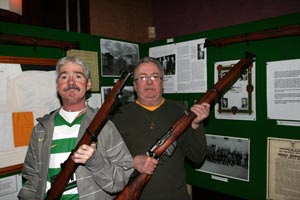20 August 2009 Edition
Fógraí bháis: Gerard McKee

Gerard McKee (left) with brother Joe
THE death of Belfast republican GERARD McKEE took place on Thursday 16 July.
Born in the Falls Road area in October 1957, Gerard grew up as the conflict in the North developed into the armed insurrection that saw the IRA challenge British rule in Ireland. Like so many people of his generation, Gerard rose to the challenge and took up arms against the British enemy and spent many years in prison as a result.
Jim McGivern delivered the main oration at Gerard’s graveside, an edited version which An Phoblacht carries here.
"ON behalf of the Republican Movement, republicans across this country and on your behalf, I would like to offer our sincere condolences to the McKee family on the untimely death of Gerard; to Geraldine, his loving partner and best friend; Gerard’s children, Martin, Colleen, Geraldine, Michael and Marie; and also his eight brothers and two sisters.
Gerard was born on 30 October 1957 and lived in Masserene Street, in the Pound Loney area, with his mother, father, brothers and sisters.
Although the family moved to Rosnareen in Andersonstown in July 1969, when I was speaking with Gerard’s oldest brother, Jim, yesterday, he stressed the importance of the family retaining a strong affiliation with the ‘Lower Whack’ area and the community, and Jim himself still lives within that community.
Gerard attended St Comgall’s Primary School and then St Peter’s Secondary School in Britton’s Parade. He had a love of sport and was a keen soccer player, joining the Immaculata Football Club at 12 years of age.
Gerard and Geraldine were married in 1978 and eventually settled in Turf Lodge where they both worked hard to provide for their family.
When I was talking to Geraldine recently she spoke of the many happy times they spent together, especially of holidays in Ballycastle, which Gerard loved.
It would be fair to say that, in all my dealings with people over the years, when Gerard’s name came up in conversation I never heard anyone having a bad word to say about him. He was a quiet, unassuming person who, like many here today, came up through a hard school: he was an Irish republican and deeply committed to the struggle for Irish independence. And like many republicans, Gerard saw the hardship and brutality on our streets and decided to do something about it: he joined the Irish Republican Army.
IRA OPERATIONS
He was an active Volunteer in the ‘Lower Whack’ and throughout the city was involved in many IRA operations.
Many years ago, when I met Gerard for the first time, it was clear that he was very single-minded and possessed an ability to get things done, a quality that was important in his role as an IRA Volunteer.
Gerard was a very thoughtful Volunteer who continually sought methods and means of advancing our capability around taking the war to the enemy. All the many qualities that he possessed made him a Volunteer respected by his comrades and feared by British state forces.
When taking part in operations he instilled a sense of confidence in younger Volunteers who felt safe in his company and looked up to him.
It was not long before the Brits were on his trail and he was arrested and remanded in Crumlin Road Jail in late 1981.
Upon his release, Gerard again reported back to the Army and was once more active in the city. He remained very active until he was captured in 1986 along with Jimmy McGrath.
THE LANGUAGE
Alec Murphy mentioned to me recently that Gerard’s time in the H-Blocks saw him concentrate on the Irish language and other comrades with him at that time also recall his dedication to the language.
He possessed a great sense of humour, dignity and self-respect and he retained this right up to his death.
Recently, when Seán Adams and myself went to see Gerard in hospital we were impressed but not surprised with the tremendous courage he displayed. It was clear Gerard had his own plans about how he wanted his funeral to go and it was that presence of mind that reflected what Gerard was all about.
In the period just prior to Gerard’s death he was delighted to see old comrades and although he was frustrated at not being able to communicate verbally, the expression on his face told its own story.
We shared many hard times together but we also shared many good times – and many laughs.
I know we will meet again and until that time – Slán mo chara."
